 Petzlover
Petzlover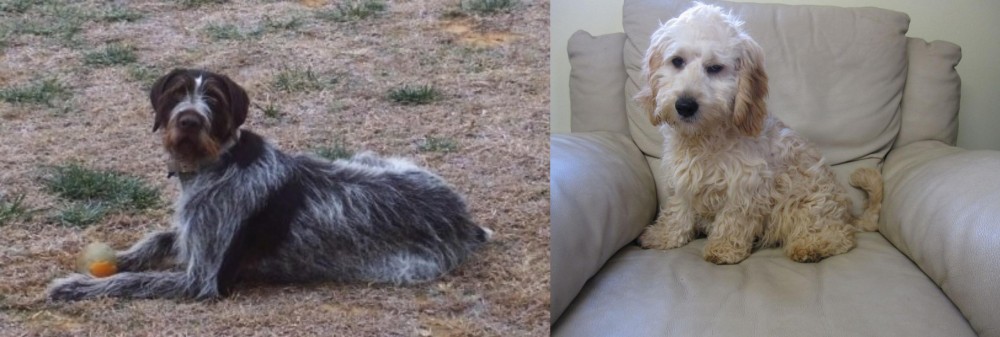 Deutsch Drahthaar is originated from Germany but Cockachon is originated from United States. Deutsch Drahthaar may grow 29 cm / 12 inches higher than Cockachon. Deutsch Drahthaar may weigh 23 kg / 51 pounds more than Cockachon. Both Deutsch Drahthaar and Cockachon has almost same life span. Both Deutsch Drahthaar and Cockachon has same litter size. Deutsch Drahthaar requires Moderate Maintenance. But Cockachon requires Low Maintenance
Deutsch Drahthaar is originated from Germany but Cockachon is originated from United States. Deutsch Drahthaar may grow 29 cm / 12 inches higher than Cockachon. Deutsch Drahthaar may weigh 23 kg / 51 pounds more than Cockachon. Both Deutsch Drahthaar and Cockachon has almost same life span. Both Deutsch Drahthaar and Cockachon has same litter size. Deutsch Drahthaar requires Moderate Maintenance. But Cockachon requires Low Maintenance
 Hailing from Germany in the 20th century, the Deutsch Drahthaar, also known as the German wirehaired Pointer, has always been a hunting dog. He was developed to take part in hunting in field or water.
Hailing from Germany in the 20th century, the Deutsch Drahthaar, also known as the German wirehaired Pointer, has always been a hunting dog. He was developed to take part in hunting in field or water.
Breeders of this dog were successful in developing a skilled and versatile hunting dog that took its traits from the best coarse haired dogs.
It was in 1902 that the German breed club for the Deutsch-Drahthaar was founded.
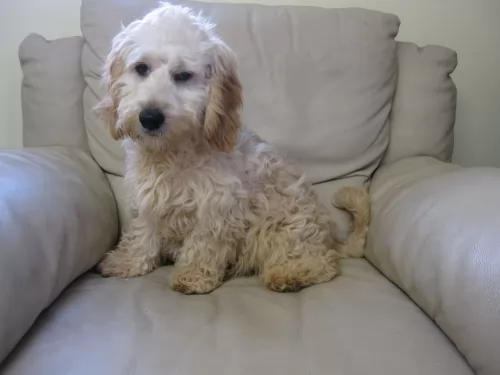 The Cockachon is not a pure bred dog but rather a cross between the Cocker Spaniel and the Bichon Frise. Very little if anything is known about who initially developed the Cockachon. It is known that the International Designer Canine Association (IDCA)registered and recognized the hybrid in 2009.
The Cockachon is not a pure bred dog but rather a cross between the Cocker Spaniel and the Bichon Frise. Very little if anything is known about who initially developed the Cockachon. It is known that the International Designer Canine Association (IDCA)registered and recognized the hybrid in 2009.
It is obviously a relatively new cross breed. The hybrid is also recognized by the American Canine Hybrid Club (ACHC), International Designer Canine Registry (IDCR) and the Designer Dog Kennel Club (DDKC).
 The Deutsch-Drahthaar is a medium sized well muscled sporting dog standing at 61 to 68 cm and weighing 27-32kg.
The Deutsch-Drahthaar is a medium sized well muscled sporting dog standing at 61 to 68 cm and weighing 27-32kg.
He is very distinguishable with his wiry water-resistant coat which comes in different colors such as liver, grey or black patches with a speckled or ticked background.
He has strong, straight legs with rounded paws which are webbed for strong swimming abilities. He has dark eyes with floppy, high set ears and a long tail. Many people still want the dog to have that distinctive look and they opt to have the tail docked.
The Deutsch-Drahthaar is a fantastic hunting companion, loving nothing more than to be working at running across fields and plunging into water to retrieve prey.
Its the kind of dog that will fit well into family life but he will require exercise. Failing to give him exercise and attention will make him bored, frustrated and destructive.
He is a friendly, gentle dog yet he becomes protective when he feels his family is threatened. Training and socialization turn him into an excellent pet as he is a strong-willed dog that will take advantage of an owner who isn’t firm with him.
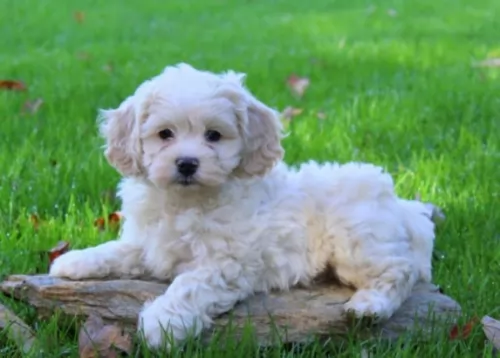 The Cockachon is a cute, little dog very popular in current times. He is small, compact, dark eyes, a round head and black nose. He has a baby face and fluffy hair. It has a furry tail and a blunt muzzle.
The Cockachon is a cute, little dog very popular in current times. He is small, compact, dark eyes, a round head and black nose. He has a baby face and fluffy hair. It has a furry tail and a blunt muzzle.
The Cockachon is a mix between the American Cocker Spaniel and the Bichon Frise. In order to get a better idea of what the hybrid can look like just look at the individual parents. The American Cocker Spaniel is a small dog with a short muzzle and domed head. It is in the Sporting Group, but it is the smallest member of the group. He has a compact, sturdy body and though domed his head is refined.
The Cocker’s stance includes a sloping topline, muscular hindquarters and strong shorter legs adds up to a balanced canine. The coat can be in a wide variety of colors including liver, golden, black, and red. Also, it could be liver and tan, black and tan, roan or tricolors. So, while the Bichon Frise is always white the Cockachon can be any of these colors including white. The types of coats that the Cocker Spaniel and the Bichon Frise have are very different as well.
The Bichon Frise is also a small dog, actually smaller than the American Cocker. The Cockachon usually ends up being about the size of the Bichon at 5-10 kg in weight and 23-30 cm in height. The skull of the Bichon Frise is round rather than domed and the muzzle is also rounded. The tail is long and curly while the Cocker would usually have a cropped tail. The nose and eyes of the Bichon Frise are black and its hair is dense and curly. Unlike the Cocker Spaniel it barely sheds.
Many Cockachon have floppy ears, curly coats and come in any variety of colors though many, many are white.
 The German Wirehaired Pointer is an active, energetic dog who is happiest when performing a task or getting some exercise in. He is also a social dog, who loves spending time with his human family. It is important for him to get noticed by his human family, and he is a dog that gets on well with children in the home as well as pets.
The German Wirehaired Pointer is an active, energetic dog who is happiest when performing a task or getting some exercise in. He is also a social dog, who loves spending time with his human family. It is important for him to get noticed by his human family, and he is a dog that gets on well with children in the home as well as pets.
Never just put your Pointer in the back yard and expect him to entertain himself. He wants to be included in all your activities, whether you’re walking, jogging or cycling.
A happy Deutsch Drahthaar will make sure that he gives you your full quota of love, loyalty, protection and companionship.
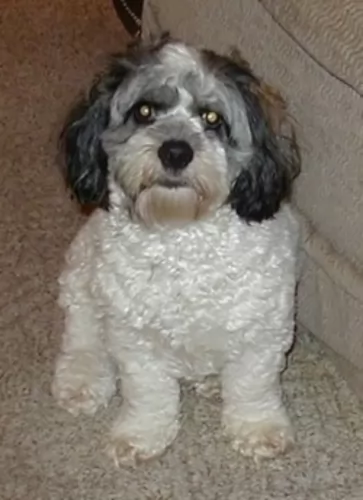 People created the Cockachon to get a small, lap or carry dog that had certain characteristics. These characteristics included a very social, loving dog. He is active and friendly, sweet and gentle. He is loyal, and loves being loved. He is great with other dogs and you can trust him with your children. He is a little independent but very loyal.
People created the Cockachon to get a small, lap or carry dog that had certain characteristics. These characteristics included a very social, loving dog. He is active and friendly, sweet and gentle. He is loyal, and loves being loved. He is great with other dogs and you can trust him with your children. He is a little independent but very loyal.
Like many little dogs he can have serious separation anxiety. Crate training is recommended so that he has a place to feel safe when you are not with him.
 When you start doing research on these German wirehairs, you see that they are far more prone to hip- and elbow dysplasia than the short-haired breed.
When you start doing research on these German wirehairs, you see that they are far more prone to hip- and elbow dysplasia than the short-haired breed.
Also, von Willebrand’s blood-clotting disease is something that you should know about. Your German wirehair is a healthy, robust dog and is highly unlikely to get sick, but you need to be aware of these common dog ailments so that you can help him and know what to watch for.
This Von Willebrand’s disease for instance is a blood disease brought about by a deficiency of von Willebrand Factor (vWF). A lack of this vWF impairs platelet stickiness and clumping and can lead to excessive bleeding after an injury.
You may notice bleeding from the gums, bruising of skin, prolonged bleeding after an injury as well as blood in the urine for instance. Get your pet to the vet who will perform a physical exam on your dog.
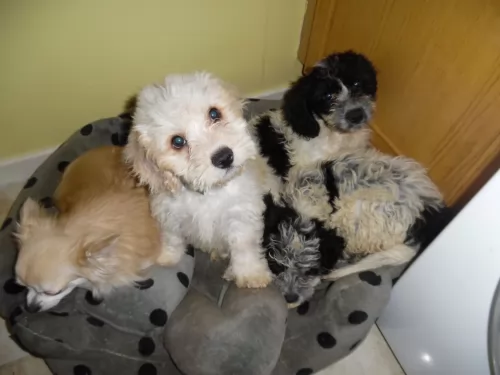 Hybrid dogs seldom have a lot of inherited diseases as they seem to jump a generation but if they do, it can be either a combination of both breeds issues or issues from just one of the breeds in the cross. For the Cockachon these issues include:
Hybrid dogs seldom have a lot of inherited diseases as they seem to jump a generation but if they do, it can be either a combination of both breeds issues or issues from just one of the breeds in the cross. For the Cockachon these issues include:
This loose kneecap issue is common to many small dogs and can cause lameness if not addressed.
Eyelid problems such as the ones that might bother a Cockachon can be found in many small dogs. These include Entropion and Ectropion.
 Your Deutsch Drahthaar does shed, and because of his wiry coat, he won’t only require a brush twice a week, but also stripping by a professional doggy parlor.
Your Deutsch Drahthaar does shed, and because of his wiry coat, he won’t only require a brush twice a week, but also stripping by a professional doggy parlor.
There are several other grooming processes that are essential for your dog. The first is to check that his nails don’t get too long. This often happens when he spends all his time on soft grass. Running on a hard surface trims them down naturally.
Also, because he has floppy ears, they will need to be checked and cleaned regularly so he doesn’t get an ear infection. His teeth will also need to be brushed twice a week as tartar and plaque build-up can cause problems with the teeth but also with other areas of the body.
If in doubt about how to groom your pet the right way, speak to your vet or a dog expert.
There is so much conflicting information on caring for dogs, even from so-called dog experts. While there are some excellent dog food manufacturers around, some experts will say that you should be feeding your dog based on what his digestive system was designed to eat and steer clear of these.
If you do feed your German wirehaired Pointer with manufactured dog food, make sure it is the very best one, because after all, nutrition plays a vital role in your pet’s health.
Try to include some cooked vegetables, brown rice and some chicken into his diet. These can be mixed into his kibble. It is expensive, but try to include some raw meat into your dog’s diet from time to time. Ensure a constant supply of cool, fresh water.
If your Deutsch Drahthaar isn’t going to be used for breeding, make sure that your have him or her neutered or spayed as this is advisable to promote good health. Not doing it can cause health issues later on.
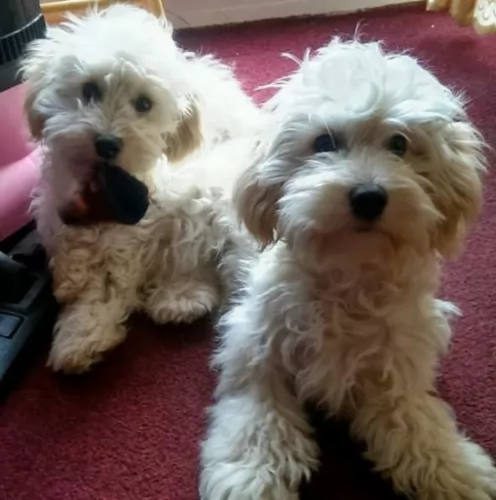 Don’t overfeed a Cockachon. Give him ¾ -1.5 cups of dry food of high quality in two meals per day.
Don’t overfeed a Cockachon. Give him ¾ -1.5 cups of dry food of high quality in two meals per day.
In addition to the issues listed above, the Cockachon is also prone to heart disease and cardiac issues.
The Cockachon has a lot of energy for its size. Make sure it gets plenty of exercise. If walks are the exercise of your choice make sure you walk him for 30 minutes a day. He loves to play, and a back yard would be nice. These little guys do well in obedience but are usually to small for agility.